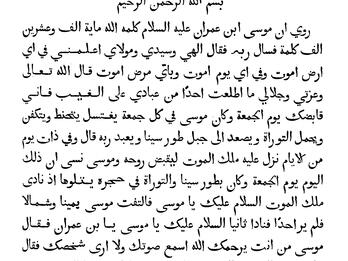Shabbetai Tzvi: Sabbatianism
During the first half of the seventeenth century some extravagant notions of the near approach of the Messianic time, and more especially of the redemption of the Jews and their return to Jerusalem, were set forth by Christian writers and entertained by Jews and Christians alike. The so-called apocalyptic year was assigned by Christian authors to the year 1666. This belief was so predominant that Manasseh b. Israel in his letter to Cromwell and the English Parliament did not hesitate to use it as a motive for his plea for the readmission of the Jews into England, remarking that “the opinions of many Christians and mine do concur herein, that we both believe that the restoring time of our Nation into their native country is very near at hand” (see Grätz, “Gesch.” x., note 3, pp. xxix et seq.). Shabbethai’s father, who as the agent of an English house was in constant touch with English people, must have frequently heard of these expectations and, himself strongly inclined to believe them, must naturally have communicated them to his son, whom he almost deified because of his piety and cabalistic wisdom.
Apart from this general Messianic theory, there was another computation, based on a presumably interpolated passage in the Zohar and particularly popular among the Jews, according to which the year 1648 was to be the year of Israel’s redemption by the Messiah. All these things so worked on the bewildered mind of Shabbethai as to lead him to conceive and partly carry out a plan which was of the gravest consequences for the whole of Jewry and whose effects are felt even at the present time: he decided to assume the rôle of the expected Messiah. Though only twenty-two years old, he dared (in the ominous year 1648) to reveal himself at Smyrna to a band of followers (whom he had won over through his cabalistic knowledge, his attractive appearance and personality, and his strange actions) as the true Messianic redeemer designated by God to overthrow the governments of the nations and to restore Israel to Jerusalem. His mode of revealing his mission was the pronouncing of the Tetragrammaton in Hebrew, an act which was allowed only to the high priest in the Sanctuary on the Day of Atonement. This was of great significance to those acquainted with rabbinical and especially cabalistic literature. However, Shabbethai’s authority at the age of twenty-two did not reach far enough to gain for him many adherents. Among the first of these to whom he revealed his Messiahship in the foregoing manner were Isaac Silveyra and Moses Pinheiro, the latter a brother-in-law of the Italian rabbi and cabalist Joseph Ergas. Shabbethai remained for several years at Smyrna, leading a pious, mystic life, and causing in the community many bickerings, the details of which are not known. The college of rabbis having at their head his teacher, Joseph Escapa, watched Shabbethai closely; and when his Messianic pretensions became too bold they put him and his followers under the ban.
About the year 1651 (according to others, 1654; see Grätz, l.c. p. xxxii) Shabbethai and his disciples were banished from Smyrna. Whither he betook himself is not quite certain. In 1653, or at the latest 1658, he was in Constantinople, where he made the acquaintance of a preacher. Abraham ha-Yakini (a disciple of Joseph di Trani and a man of great intelligence and high repute), who, either from selfish motives or from delight in mystification, confirmed Shabbethai in his delusions. Ha-Yakini is said to have forged a manuscript in archaic characters and in a style imitating the ancient apocalypses, and which, as he alleged, bore testimony to Shabbethai’s Messiahship. It was entitled “The Great Wisdom of Solomon” and began:
“I, Abraham, was confined in a cave for forty years, and I wondered greatly that the time of miracles did not arrive. Then was heard a voice proclaiming, ‘A son will be born in the year 5386 [1626] to Mordecai Ẓebi; and he will be called Shabbethai. He will humble the great dragon; . . . he, the true Messiah, will sit upon My [God’s] throne.’ ”
With this document, which he appears to have accepted as an actual revelation, Shabbethai determined to choose Salonica, at that time a center of cabalists, as the field for his further operations. Here he boldly proclaimed himself as the Messiah, gaining many adherents. In order to impress his Messiahship upon the minds of his enthusiastic friends he indulged in all sorts of mystic juggleries; e.g., the celebration of his marriage as Son of God (“En Sof”) with the Torah, preparing for this performance a solemn festival, to which he invited his friends. The consequence was that the rabbis of Salonica banished him from the city.
Notes
Date and word in brackets appear in the original source document.
Credits
Published in: The Posen Library of Jewish Culture and Civilization, vol. 7.



